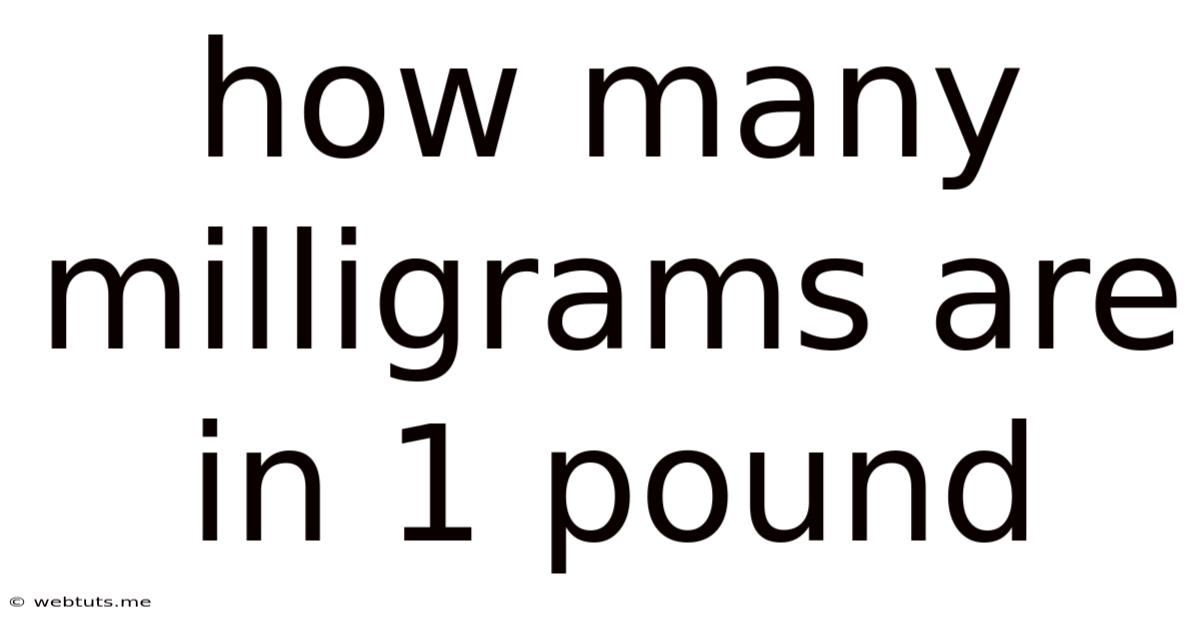How Many Milligrams Are In 1 Pound
Webtuts
May 14, 2025 · 4 min read

Table of Contents
How Many Milligrams are in 1 Pound? A Comprehensive Guide
Knowing how to convert between different units of measurement is a crucial skill, whether you're a scientist, a chef, or simply someone who enjoys precision. This comprehensive guide will delve into the conversion of pounds (lbs) to milligrams (mg), exploring the process, providing examples, and addressing common misconceptions. We'll also examine the importance of accurate unit conversions in various fields.
Understanding the Units: Pounds and Milligrams
Before diving into the conversion, let's refresh our understanding of pounds and milligrams.
Pounds (lbs)
The pound (lb) is a unit of mass in the imperial and US customary systems of measurement. It's a widely used unit, particularly in the United States and some parts of the United Kingdom, for measuring the weight of goods, people, and various other objects. It's important to note that the pound is sometimes confused with the pound-force (lbf), which is a unit of force. However, in this conversion, we're dealing with the unit of mass.
Milligrams (mg)
The milligram (mg) is a unit of mass in the metric system. The metric system is based on powers of 10, making conversions between units relatively straightforward. A milligram is one-thousandth of a gram (1 mg = 0.001 g). Milligrams are commonly used in measuring small quantities, such as the mass of medicine, chemicals, or tiny components.
The Conversion Process: Pounds to Milligrams
The conversion from pounds to milligrams involves a multi-step process because it requires transitioning between different measurement systems. Here's a breakdown of the steps:
-
Pounds to Grams: The first step is to convert pounds to grams. There are approximately 453.592 grams in one pound.
-
Grams to Milligrams: The second step involves converting grams to milligrams. Since there are 1000 milligrams in one gram, we multiply the number of grams by 1000.
Therefore, the complete conversion formula is:
Milligrams = Pounds * 453.592 * 1000
This simplifies to:
Milligrams = Pounds * 453592
This formula provides a precise conversion. For most practical purposes, rounding the conversion factor to 453,600 is often sufficient.
Example Conversions
Let's illustrate the conversion process with some examples:
Example 1: Converting 1 Pound to Milligrams
Using the precise formula:
Milligrams = 1 lb * 453592 mg/lb = 453,592 mg
Therefore, there are 453,592 milligrams in 1 pound.
Example 2: Converting 2.5 Pounds to Milligrams
Using the precise formula:
Milligrams = 2.5 lb * 453592 mg/lb = 1,133,980 mg
Therefore, there are 1,133,980 milligrams in 2.5 pounds.
Example 3: Converting 0.5 Pounds to Milligrams
Using the approximate formula:
Milligrams = 0.5 lb * 453600 mg/lb = 226,800 mg
Therefore, there are approximately 226,800 milligrams in 0.5 pounds.
Importance of Accurate Conversions
Accurate unit conversions are critical in numerous fields:
-
Pharmacology and Medicine: Precise medication dosages are often measured in milligrams. Incorrect conversions can have severe consequences for patient health. The accurate conversion of medication weights from pounds to milligrams is crucial for safe and effective treatment.
-
Science and Engineering: Research and development across many scientific disciplines require precise measurements. Accurate conversions are essential for reliable experimental results and engineering designs. Inaccurate conversions could lead to experimental errors or even structural failures.
-
Food Science and Nutrition: Nutritional information is often provided in both metric and imperial units. Accurate conversions help ensure the correct calculation of nutritional values and portion sizes. Miscalculations in food preparation can affect dietary plans and health outcomes.
-
International Trade: Global commerce requires seamless conversions between different units of measurement. Accurate conversions are vital for accurate pricing, packaging, and shipping of goods.
-
Manufacturing and Industry: Many industries utilize both metric and imperial systems. Accurate conversions are crucial for compatibility and efficiency in manufacturing processes and supply chains. Errors in unit conversion can cause material waste or production delays.
Common Mistakes to Avoid
When converting units, several common errors should be avoided:
-
Confusing Weight and Mass: It's crucial to understand the difference between weight and mass. While often used interchangeably, weight is a measure of the force of gravity on an object, whereas mass is a measure of the amount of matter in an object. In this conversion, we're dealing with mass.
-
Incorrect Conversion Factors: Using an incorrect conversion factor will lead to inaccurate results. Always double-check the conversion factor you're using to ensure accuracy.
-
Rounding Errors: While rounding can simplify calculations, excessive rounding can introduce significant errors, particularly when dealing with small quantities. Use appropriate significant figures to maintain accuracy.
-
Unit Inconsistency: Always ensure consistency in units throughout the calculation. Mixing metric and imperial units without proper conversion can lead to significant errors.
Conclusion
Converting pounds to milligrams requires careful attention to detail and the correct application of conversion factors. Understanding the process, using the right formulas, and avoiding common mistakes are essential for obtaining accurate results. The importance of accurate unit conversion extends across various fields, highlighting its significance in maintaining precision, safety, and efficiency. Remember the formula: Milligrams = Pounds * 453592 and always double-check your work to ensure accurate conversions. Mastering this conversion skill is a valuable asset for anyone working with measurements in diverse professional and personal contexts.
Latest Posts
Latest Posts
-
What Day Was It 70 Days Ago
May 14, 2025
-
90 Days From July 1st 2024
May 14, 2025
-
How Many Amps Is 480 Volts
May 14, 2025
-
How Long Is 6 Months In Days
May 14, 2025
-
How Many Days Ago Was Dec 15
May 14, 2025
Related Post
Thank you for visiting our website which covers about How Many Milligrams Are In 1 Pound . We hope the information provided has been useful to you. Feel free to contact us if you have any questions or need further assistance. See you next time and don't miss to bookmark.